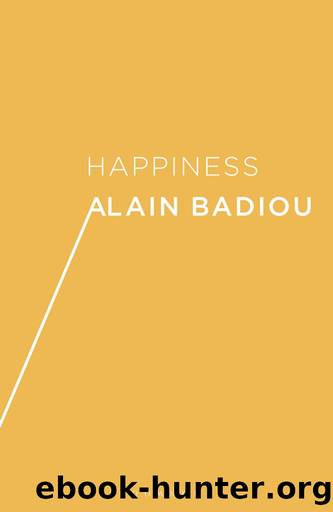Happiness by Alain Badiou

Author:Alain Badiou
Language: eng
Format: epub
Publisher: Bloomsbury Publishing
Published: 2019-08-15T00:00:00+00:00
* * *
1 S. Mallarmé, ‘Un coup de dés’ in Collected Poems, trans. with commentary H. Weinfield (Berkeley, Los Angeles and London: University of California, 1994), trans. p. 142.
2
Philosophy and Antiphilosophy Put to the Test of Happiness
I call ‘antiphilosopher’ that particular kind of philosopher who opposes the drama of his existence to conceptual constructions, for whom the truth exists, absolutely, but must be encountered, experienced, rather than thought or constructed. This is how we must understand Kierkegaard, when he says that all truth is ‘in interiority’, or, again, that ‘subjectivity itself is the distinctive sign of the truth’. But be careful! The antiphilosopher is in no way a sceptic or a relativist, a contemporary democrat, partisan of the diversity of cultures, of that variegation of opinions which, as Deleuze wrote to me shortly before dying, has ‘no need’ of the idea of truth. On the contrary, the antiphilosopher is the hardest, most intolerant of believers. See Pascal, Rousseau, Nietzsche, Wittgenstein: imperious, implacable personalities, engaged against the ‘philosophers’ in a merciless struggle. Descartes, for Pascal? ‘Useless and uncertain’. Voltaire, Diderot, Hume, for Rousseau? Corrupt, conspirers. The philosopher, for Nietzsche? The ‘criminal of criminals’, to be shot without delay. The conceptions of rational metaphysics for Wittgenstein? Pure and simple non-sense. And, for Kierkegaard, the majestic Hegelian construction? A geriatric’s absence from the world: ‘The philosopher is outside; he is not a participant. He sits and grows old listening to the songs of the past; he has an ear for the harmonies of mediation.’1
This fury of thought, indexed to an inflexible vision of personal life, is served with all the great antiphilosophers with a style that cannot be separated from their vision. It isn’t much to say that they are great writers! Pascal and Rousseau revolutionized French prose, Nietzsche drew unknown accents from the German language. Wittgenstein’s Tractatus compares only to Mallarmé Coup de dés, and Lacan, whom I have demonstrated to be, for the moment, the last truly considerable antiphilosopher, assigns psychoanalysis to an invented language.
The philosopher that I am – conceptual, systematic, infatuated by the matheme – can evidently not cede to the song of these marvellous and carnivorous sirens that are the antiphilos-ophers. But there is a duty to think to the height of the challenge they represent. As Ulysses, attached to the solid mast of what is in play in the thought of the Absolute after Plato, he must hear them, understand them, and impose upon himself the duties to which their acrimony recalls him, for, without them, he would become a consensual democrat, a propagandist of a seemly little happiness, and an adept of the imperative ‘Live without Idea’.
What impassions me, in these violent and superb adversaries, is the following: against the contractual and deliberative moderation inflicted upon us today as a norm, they recall that the subject has no chance to hold itself at the height of the Absolute except in the tense and paradoxical element of choice. One must wager, says Pascal; one must encounter in
Download
This site does not store any files on its server. We only index and link to content provided by other sites. Please contact the content providers to delete copyright contents if any and email us, we'll remove relevant links or contents immediately.
The remains of the day by Kazuo Ishiguro(7551)
Tools of Titans by Timothy Ferriss(6947)
The Black Swan by Nassim Nicholas Taleb(6191)
Inner Engineering: A Yogi's Guide to Joy by Sadhguru(5897)
Giovanni's Room by James Baldwin(5878)
The Way of Zen by Alan W. Watts(5800)
The Six Wives Of Henry VIII (WOMEN IN HISTORY) by Fraser Antonia(4790)
The Power of Now: A Guide to Spiritual Enlightenment by Eckhart Tolle(4755)
Astrophysics for People in a Hurry by Neil DeGrasse Tyson(4620)
Asking the Right Questions: A Guide to Critical Thinking by M. Neil Browne & Stuart M. Keeley(4576)
12 Rules for Life by Jordan B. Peterson(3734)
The Ethical Slut by Janet W. Hardy(3503)
Skin in the Game by Nassim Nicholas Taleb(3460)
Housekeeping by Marilynne Robinson(3401)
The Art of Happiness by The Dalai Lama(3384)
Double Down (Diary of a Wimpy Kid Book 11) by Jeff Kinney(3272)
Skin in the Game: Hidden Asymmetries in Daily Life by Nassim Nicholas Taleb(3264)
Walking by Henry David Thoreau(3234)
12 Rules for Life: An Antidote to Chaos by Jordan B. Peterson(3200)
